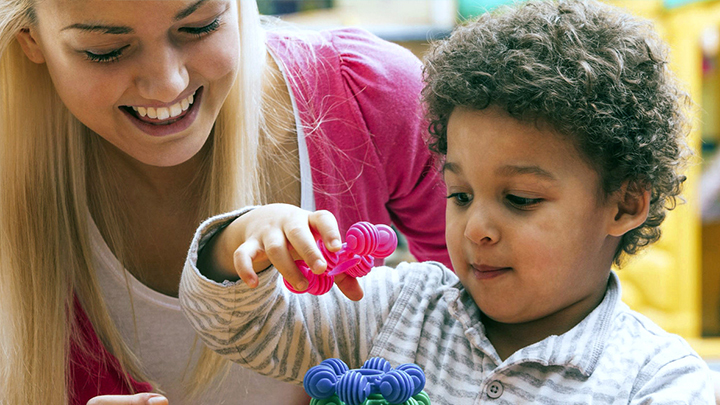
January 12, 2024

The Pediatric Rehabilitation Line provides advice to parents and caregivers of infants, children and youth (birth to 18 years) who have concerns about developmental milestones in areas such as moving and playing, talking and listening, taking care of self, managing emotions, and more. The line can also help callers who are looking for local services and/or current rehabilitation resources.
Story by Vanessa Gomez
Children and youth live better through pediatric rehabilitation as it helps them to build resilience and take part in the world around them.
For Lindsay Evans, the Pediatric Rehabilitation Advice Line turned out to be a valuable tool in assessing and treating her four-year-old son’s troubles with toilet regression, which occurred after shifts in their lives required him to adjust to new environments.
“It was important to get everyone on the same page about my son’s care,” says Evans. “I called 811 Health Link and was referred to the Pediatric Rehabilitation Line to see how we could help him.”
The line provides advice to parents and caregivers of infants, children and youth (birth to 18 years) who have concerns about developmental milestones in areas such as moving and playing, talking and listening, taking care of self, managing emotions, and more. The line can also help callers who are looking for local services and/or current rehabilitation resources (e.g., links to information or webinars).
“Parents and providers work together every step of the way to focus on the health and developmental needs of children and youth,” says Kira Ellis, Program Manager, Rehabilitation Advice. “It’s an accessible way for parents to get the immediate advice and care they need while we reduce pressures on other areas in our healthcare system.”
The Pediatric Rehabilitation Line is integrated into the existing Rehabilitation Advice Line, which is staffed by physiotherapists and occupational therapists, and was launched in 2020. The Rehabilitation Advice Line answers more than 10,000 calls a year.
“The providers were very supportive and ensured all my son’s supports were included in developing a new routine for him,” says Evans.
“It was just a phone call away, which made it convenient, and I was able to carve out time during my lunch breaks to connect. With their advice, we now have an age-appropriate book about toileting, and we get to engage my son in creative ways to make toileting a more comfortable experience.”
AHS also offers free webinars that cover a range of developmental topics for children and youth from birth to 18 years. Topics range from toilet training and tummy time to emotional regulation, speech development, puberty and more.
“Parents and caregivers can build skills to implement in their child’s environments and support their development,” says Ellis. “They gain confidence and become active members of their child’s healthcare journey.”
Today, Evans, her son and their support system have helped them to develop the skills they need for growth and development, regardless of her son’s environment.
“As a parent, you can have a big impact on your child’s care,” adds Evans. “I’m grateful for the support the line provided us — it’s accessible, safe, and age-appropriate and the experts are there every step of the way.”
Parents looking for advice can call the Rehabilitation Advice Line at 1-833-379-0563 (Monday to Friday from 9 a.m. to 5 p.m.) to be directed to the Pediatric Rehabilitation Advice Line — or they can visit Webinars (alberta.ca) for information on upcoming webinars.